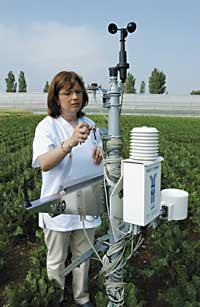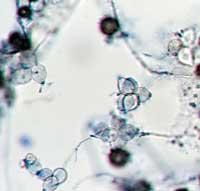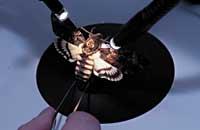System to help improve agricultural production

Many phenomena of nature cannot be controlled, but they can be predictable. To do this, NEIKER (Basque Institute for Agricultural Research and Development) has created an observatory of agroforestry warnings (OAC) in the Basque Country, with the aim of helping farmers and foresters improve their production. This observatory offers three types of information. First, it has developed a system of immediate recommendations for disease and pest control.
Secondly, it will support farmers and foresters in adapting fertilization and irrigation programmes. And finally, it has organized an alert service to communicate risk phenomena for forest and crop ecosystems. We will know better the characteristics of each service.
Immediate recommendations system
The Agroforestry Advisory Observatory closely monitors pests and warns as soon as possible of the highest risk of diseases and pests. Normally, chemical treatments are used to combat them, but Neiker's staff opts for the least aggressive with the environment.
They also analyze climate data and pest incidence through chromotropic traps, colors or pheromone hormones. Thanks to these strains, a series of data is obtained that make it easier for researchers to know when chemical treatments should be performed.

The purpose of the service offered by NEIKER is to inform farmers and foresters as soon as possible. To do this, in addition to publishing this information on their website, they maintain telephone and telephone contacts with managers of cooperatives and associations.
In addition, with the aim of improving the observatory's warning system, new tools have been implemented. Among them are the network of mobile agrometeorological observatories. This network allows to determine the most dangerous times of pest propagation, both in climatic and agronomist data.
Fertilizer and irrigation
The main objective of the Observatory of Agroforestry Notices of the Basque Country is the reduction of polluting additives and the optimization of natural resources.
Every week NBAB provides information on the water needs of beet and potato. These recommendations are based on climate and agronomic data. The weather data come from the meteorological observatories of the Basque Meteorological Service and strategically located agrometeorological observatories.

On the other hand, NBABs provides information to be able to properly program the food needs of agricultural and forestry crops. Specifically, interested parties are provided with information on sampling soil, leaves and other substrates. Through them the need for fertilization of crops is determined, taking into account their phenological state (flowering, hosteo, migration, etc. ).
Crop health risk warning service
NEIKER, thanks to this observatory, will report any new risk that threatens cultivation in Euskal Herria. Among the dangerous elements are the appearance of plant pathogens resistant to pesticides, the appearance of new pests or diseases in the neighboring rural centers or the use of new cultivation techniques that can increase the influence of pests.
The Basque Institute for Agricultural Research and Development is responsible for collecting and analyzing all these data that affect agriculture and forestry. The information you disseminate through your website and other means you communicate with (telephone, fax...) is of interest to farmers and foresters. In fact, Neiker often not only informs them of the problems that may arise, but offers advice to deal with them. The main objective of this is to improve production and reduce damage.





